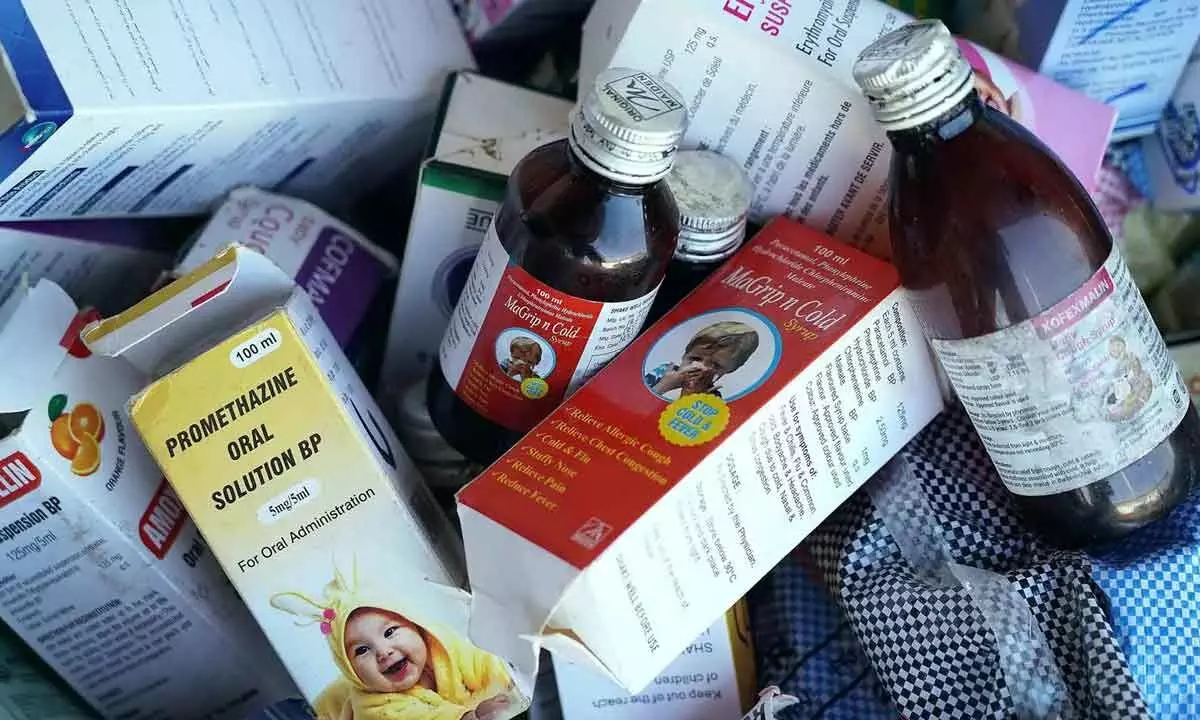Cough syrup deaths: Time to make regulations more stringent than ever
Mandating usage of duly-certified isopropyl alcohols or IPAs in medicines could be a first step
image for illustrative purpose

Towards the end of last month, it was widely reported how the WHO had raised a ‘product alert’ on cough syrups made in and originating from Punjab, a fact confirmed by the CDSCO. The cough syrups were found to have contained ‘unacceptable amounts’ of toxic diethylene glycol and ethylene glycol. This was reminiscent of a similar incident last year in October when the WHO had issued a medical alert over cough syrups coming from another State in India and potentially responsible for children’s deaths in The Gambia, a West African country.
Even as it confronts and attempts to navigate through these adverse developments, the government must also turn its attention to the continuing violation of protocols on usage of isopropyl alcohol or IPA, under Section 16 and the Second schedule of the Drugs and Cosmetics Act 1940. IPA, a colourless, flammable liquid with a strong odour, is a widely-used solvent or excipient in the making of bulk drugs and drug formulations apart from also finding usage as a common ingredient in products such as hand sanitizers, antiseptics, and disinfectants.
However, just as cough syrup makers have been illegally using diethylene glycol and ethylene glycol as a cheaper substitute for glycerine and propylene glycol, the other Indian drug manufacturers too regularly make use of cheap and imported IPA, a product that fails to meet various critical parameters covered in Pharmacopeia Standards such as UV absorbance test, identification of unsaturated hydrocarbons and rapidly carbonizable material. That the usage of such sub-standard non-pharma grade IPA adversely affects the quality and safety of the drug is hardly an overstatement.
It must be remembered that since solvents such as IPA, Toluene, Acetone, and others are imported in bulk and stored in commingled tanks at different ports, the likelihood of contamination through different handling stages is very high thereby posing a huge risk to the health and life of the end-user using any pharma product containing these ingredients. Moreover, the imported IPA stored in commingled tanks at Indian ports does not meet the pharmacopoeia standards. In fact, traceability of source which is one of the important parameters carefully pursued by the pharma industry is a missing link when it comes to comingled storage of solvents. Importantly, the US Pharmacopeia have included UV absorbance test for IPA in USP which will be effective from December 2023. This will make IPA USP standard more stringent and ensure that only right quality of IPA goes to pharma applications.
Incidentally, only days before the Punjab news came out, the CDSCO came out with a circular with a view to ensure that that drug manufacturers comply with the standards of identity, purity and strength as specified in the Indian Pharmacopoeia or the Pharmacopoeia of any other country. Around the same time, the Central Drugs Standard Control Organisation (CDSCO) flagged 48 commonly used medicines as they failed the latest drug safety alert issued by the drug regulator. Earlier in March this year, the government had cancelled the license of 18 pharma companies for making spurious and adulterated medicines and breaching of good manufacturing practices (GMP).
The Indian pharmaceutical sector consumes roughly 170,000 metric tonnes (MTs) of the overall India IPA demand of around 230,000 MT in FY23. Of the 170,000 MT of IPA consumed by the pharma Industry, only about 15-17 per cent is pharma grade, meeting Indian and other Pharmacopeia Standards. The rest is non-pharma grade. “To repeatedly witness these tragic eventualities on foreign shores on account of frequent slip-ups through the Indian drug regulatory system is not only embarrassing from a diplomatic and moral standpoint. If we do not take corrective measures, it can turn out to be immensely damaging for India’s pharma export interests. In fact, these unfavourable instances should serve as a policy trigger for the government to also come down hard on manufacturers who do not observe the standards for solvents and excipients such as IPA and others, as laid down in the Indian Pharmacopoeia. Admittedly, there has been no reported incident related to IPA as yet. But this doesn’t rule out a disaster from eventuating in the future, said Vikas Biyani, an expert who has closely worked with a state regulatory body.
“Taking a cue from Public Grievances for improving standards of API which are sold in Indian market by Indian manufacturer, DCGI by letter dated 21.04.2023 issued direction to all State/UTs Drug Controller and all Zonal/Sub -Zonal offices of CDSCO to ensure the compliances with prescribed standards. The states such as Maharashtra and Karnataka have also issued circulars requiring all pharma manufacturers to procure solvents complying with pharmacopeial standards. However, such responses cannot be reactive and of an ad hoc nature. The central authority should simply make it mandatory for all drug manufacturers and under all circumstances, to only procure and use IPA and all other solvents that are manufactured and imported by Licensee and conform to Indian pharmacopeial standards, or other country’s standards as the case may be,” added Biyani.

